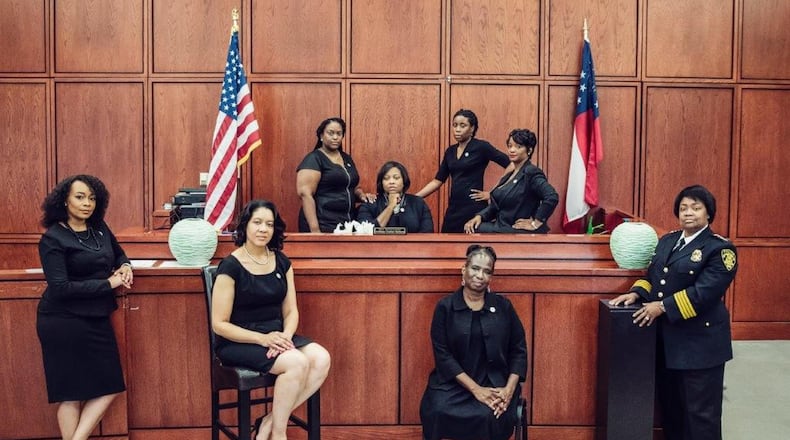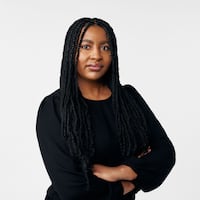It started with a photograph. The iconic picture published by the Atlanta Voice last week showed eight African-American women — stoic, polished and dressed in black — with the wood-paneled walls of a courtroom as their backdrop. In the City of South Fulton, that is what justice looks like — a law enforcement and municipal court system that is led exclusively by black women.
"I didn't notice until (LaDawn Jones) said something … she walked in and said 'Oh, my God! Look at all this black girl magic,'" municipal court clerk Kerry Stephens said.
The photo became an internet sensation almost instantly, going viral on both Instagram and Twitter.
“I didn’t realize it was a big deal until reading the comments and hearing people say ‘Oh, someone I know doesn’t even live in the state and they saw this,’” Clerk of Court Ramona Howard said.
Such a criminal justice system seems revolutionary in the era of the #MeToo movement and on the heels of the #BlackLivesMatter movement. But the racial and gender makeup of the team, which was brought together after a series of months-long talent searches that started last year, is a matter of happenstance.
“It happened by accident,” said interim police chief Sheila Rogers. “It wasn’t planned. With myself and my counterparts, justice was at the top of our list.”
Rogers is the most recent addition to South Fulton's criminal justice leadership. She was sworn in March 5, joining the ranks of Court Administrator Lakesiya Cofield; Chief Judge Tiffany Carter Sellers; City Solicitor LaDawn Jones; Public Defender Viveca R. Famber Powell; Clerk Tiffany Kinslow; Clerk Kerry Stephens; and Clerk of Court Ramona Howard.
It’s a seemingly rare feat. According to an American Judicature Society study, 12.6 percent of judges chosen since 2000 were minorities in 2008, and 29.2 percent of judges selected in the 21st century are were women. The Sourcebook of Criminal Justice Statistics reports that of all full-time sworn personnel in large city police departments, 16.3 percent were female and 38.1 percent were minorities.
But what might be considered an anomaly in other cities isn’t uncommon in South Fulton, city solicitor Jones said.
“I grew up in South Fulton. I grew up in neighborhoods where everyone around me were strong, independent, business-owning African-Americans, so black excellence is mundane to me,” she said. “ But, I recognize that this is an anomaly for other cities, and to see this many educated black women working as hard as we do is special for other little girls out there.”
About 95,000 people live in South Fulton and nearly 90 percent are black.
“Atlanta has a history of black excellence,” public defender Viveca Famber Powell said. “People routinely go to college in Atlanta — routinely pursue advanced degrees. It’s who we are.”
Several of the women are the first person to hold their respective positions; though it is now the fifth largest city in Georgia, the southwest region of Fulton County has only been a city in name for a little over a year.
That meant building a court system from the ground up, Howard said.
“On my first day, I walked in my office and there was a desk and a chair,” she said. “We started with a blank canvas. We created everything, except for the law.”
It was a challenge, she said, worsened by the fact that though the city is new, the people living in it have previous exposure to criminal justice systems.
In other news:
“You’ll see a lot of people who come to court and have had less than stellar experiences with police officers, and to them we are an extension of whatever happened to them during their arrest or some previous arrest,” Jones said.
Chief Judge Tiffany Carter Sellers said she tries to counteract their bad experiences elsewhere with her own policy of respect and education. In court she explains the reasons for her decisions to defendants. That policy is not unique to her, she said; every leader in the South Fulton criminal justice system operates that way.
“I think all of us are genuinely invested,” Sellers said. “I know several of us live in the community, have gone to school or have been reared in the community and so there is this personal attachment to the community that I’m not certain exists in other places. It’s personal for us.”
About the Author




